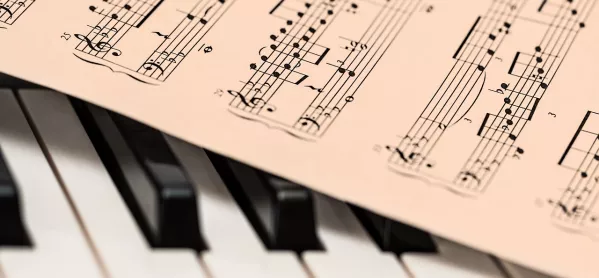It’s not often that music hits the educational headlines - more’s the pity.
To be sure, last autumn saw some discussion about the place of music in schools when, first, Ofsted boss Amanda Spielman bewailed the decline of nursery rhymes in junior schools (a claim hotly contested by many): next, French president Emmanuel Macron suggested that French school children should be made to sing the national anthem for two hours a week (surely a bit of overkill in even the most patriotic institutions!).
The poet Roger McGough returned to the topic of nursery rhymes in last week’s Tes magazine; but, nonetheless, among the creative subjects, art and drama tend to have a louder voice in the education press than music. But not this week.
West Yorkshire’s Bingley Grammar School hit the headlines when it emerged that it had taken music GCSE out of the curriculum, offering it instead as an after-school extra. Luke Weston, the school’s headteacher, told The Times, “Last year, we had two or three kids in class and now, having moved to our new system, we’ve got 25, which is more than we’ve had in the last five years. We have had no complaints from parents.”
It’s a bright idea, then, surely? Not so fast: critics, led by the Incorporated Society of Musicians (ISM), denounced the plan as “shocking and deeply troubling”.
What’s upset people, is fact that the school is charging students a nominal £5 a week for these after-school classes, the income helping to cover the cost of two professional musicians who come into to do the teaching. Predictably the argument came that poorer families would be put off from paying that admittedly small fee, putting music in greater danger than ever of becoming the preserve of the better-off.
People my age remember the glory days when lessons on the whole range of instruments were offered to children free in schools. Well-resourced music centres in local authorities up and down the land created astonishing developmental structures whose outstanding county youth orchestras wowed audiences at home and abroad: sadly, they’re nowadays as rare as hens’ teeth.
Maintaining my new year resolution to be contrary, however, I’m not particularly offended by that £5 charge per se. It’s not a vast sum and I see little reason to take issue with the head’s statement that it doesn’t appear to be putting students off studying GCSE music.
But I am offended by the notion that this particular subject, always a part of the school curriculum and almost always on offer as a GCSE choice, should be removed from the options on offer to children. Of course, there is an argument that, by putting it outside that range of choices, the school spares children that kind of arbitrary choice between false alternatives which all options involve - choosing between, say, music and history, geography and drama. But I can’t help suspecting that underneath lie two unworthy motivations.
Firstly, children are increasingly likely to choose those subjects elevated by the government to the status of being part of the EBacc: the bogus hierarchy that should never have been created, let alone form a basis of a means of judging school performance, effectively constrains choice.
Secondly, there is a suggestion that doing an extra GCSE outside school enables pupils to cut another notch on their educational belt. Mercifully, there is no intrinsic or measurable advantage to them to boast 8, 10 or even 15 GCSEs: indeed, some universities suggest that a candidate who applies with 15 GCSEs should “get out more”, but students are still frequently encouraged to do more and more exams.
Serving as interim head of a specialist music school, I might be accused of special pleading. But, although this subject is close to my heart, I’d feel the same about any creative (and all too often undervalued) subject being treated thus. I don’t seek to judge or criticise the school, and apologise if it seems that I am. But I do think this is a wrong decision stemming from the hierarchy of subjects created by the EBacc.
It’s another of those perverse incentives created for schools by excessive government pressure and interference. In 2018, we should know better.
Dr Bernard Trafford is a writer, educationalist and musician. He is a former headteacher of the Royal Grammar School, Newcastle, and past chair of HMC. He is currently interim head of the Purcell School in Hertfordshire. He tweets @bernardtrafford
To read more of his columns, view his back catalogue
Want to keep up with the latest education news and opinion? Follow Tes on Twitter and Instagram, and like Tes on Facebook




